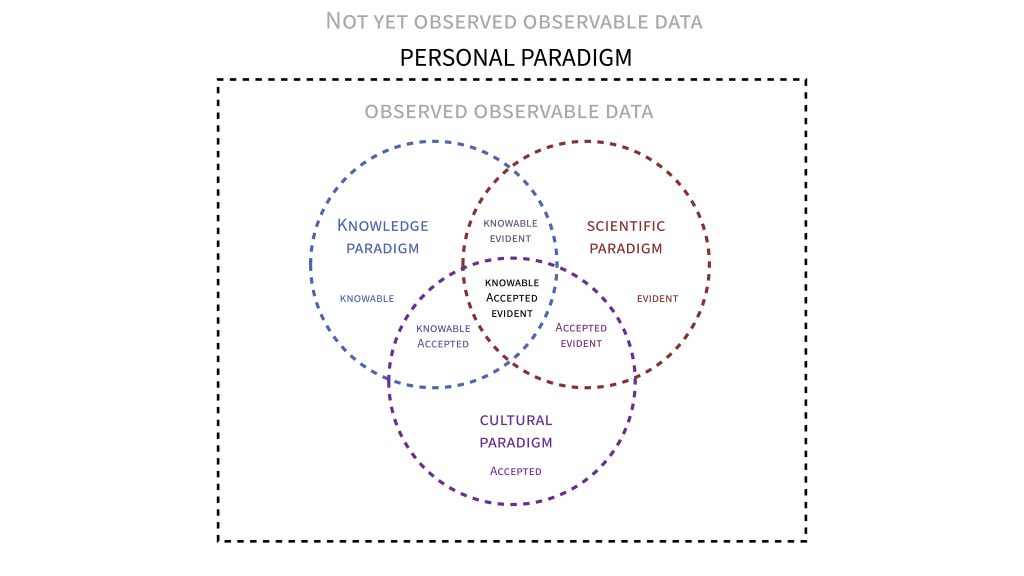
Personal Paradigm = (Knowledge + Cultural + Scientific) paradigms combined
A Personal Paradigm is the culmination of what is knowable, evident and accepted by you, acquired through the people you interact with as well as the experience you go through throughout your life.
The meaning behind the word ‘paradigm’ comes from Thomas Kuhn, where a paradigm is defined as a particular and accepted set of thoughts and assumptions about the way things are.
He also coined the term paradigm shift, where a fundamental change in someones paradigm creates too many contradictions in it, causing a shifting to a new paradigm where the process of building and curating a new paradigm comences.
Knowledge
In this regard, Knowledge for example is a forever changing set of thoughts and assumptions made in the mind and changed through your environment. They are organised through interconnected sets of Beliefs, Justifications, and Truths about the world. This in turn, helps the mind make a simulation of how it thinks the world operates and functions, which then helps you practically by trying to make predictions of future actions and events, so that fatal mistakes can be prevented and energy can be conserved.
Scientific
The purpose of science is to attempt to describe the world and how it functions through observation and experimentation, also called gathering scientific evidence.
Cultural
Culture is defined by the ideas, customs, and social behaviour of a particular people or society. What is accepted by others about how you think and act is portrayed by how others behave in response to your own behaviour and the rules set by a governing entities in which members of set society will condemn you to certain punishments, if those rules are ever broken and reported. Governing entities can be group Leaders, Religious groups or Local Councils or Governmental bodies from empires or countries.
Combining All 3 Paradigms
When each of us is born, our paradigms are there but there is not much inside and so we gather data from the world to slowly build each paradigm with time. As our brains develops, we examine the paradigms our brains have formed over this period of collection and see how it holds up to reason and judgment, which comes from building our knowledge paradigm and understanding the concept of justification and truth.
In school, we learn how to perform experiments and how to write the results down in a report, which helps the individual learn about the models and simulations the scientific community has constructed to show how the world functions based on the evidence currently held at the time of writing.
And then as we turn into adults and start to venture out of the home without the full guidance from our parents, we start to see the laws set by governments through fines we receive through small things like driving and bank charges. We find out when we enter other peoples homes about the actions they perform and the reasoning behind it, whether that be through knowledge, science or religious influence.
After some time, peoples paradigms inside their own minds metaphorically form into living organisms that they have created a symbiotic relationship with. Because of the immense amount of time and energy committed to forming and curating this paradigm, they become protective of it and some are willing to die to protect it.
Because paradigms are just thoughts, ideas and assumptions about the world, and not actual organisms, they can be shared with other members of society. But even so, a paradigm which has influential ideas can sway many people to act as if this paradigm is alive and devote their allegiance to it.
Paradigms are powerful tools that has the potential to save us time, energy and potential harm through curating and forming things that are knowable, evident and accepted.
But we as people need to take care when building these paradigms as time and energy can be wasted when our view on reality is too distorted, which can cause us real potential harm if too many things we follow end up as falsehoods, fallacies and even lies told by other people.
If we as people individually are patient, logical and calm. Examine things offered by the world through reason, good judgement and awareness, then a paradigm that works for us, that allows us to live a simple, and yet satisfying life by saving time and allow ourselves to not exert ourselves too much and still produce some good results, may allow us to slowly share the paradigm we have constructed and hope some parts of it can give the same benefits we have been granted to them as well, with the intention that malice is never exchanged, or in any case received by others through this exchange of ideas through personal paradigms.